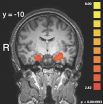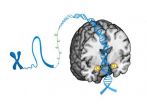(Press-News.org) PHILADELPHIA — Consumption of a type of starch that acts like fiber may help reduce colorectal cancer risk associated with a high red meat diet, according to a study published in Cancer Prevention Research, a journal of the American Association for Cancer Research.
"Red meat and resistant starch have opposite effects on the colorectal cancer-promoting miRNAs, the miR-17-92 cluster," said Karen J. Humphreys, PhD, a research associate at the Flinders Center for Innovation in Cancer at Flinders University in Adelaide, Australia. "This finding supports consumption of resistant starch as a means of reducing the risk associated with a high red meat diet."
"Total meat consumption in the USA, European Union, and the developed world has continued to increase from the 1960s, and in some cases has nearly doubled," added Humphreys.
Unlike most starches, resistant starch escapes digestion in the stomach and small intestine, and passes through to the colon (large bowel) where it has similar properties to fiber, Humphreys explained. Resistant starch is readily fermented by gut microbes to produce beneficial molecules called short-chain fatty acids, such as butyrate, she added.
"Good examples of natural sources of resistant starch include bananas that are still slightly green, cooked and cooled potatoes [such as potato salad], whole grains, beans, chickpeas, and lentils. Scientists have also been working to modify grains such as maize so they contain higher levels of resistant starch," said Humphreys.
After eating 300 g of lean red meat per day for four weeks, study participants had a 30 percent increase in the levels of certain genetic molecules called miR-17-92 in their rectal tissue, and an associated increase in cell proliferation. Consuming 40 g of butyrated resistant starch per day along with red meat for four weeks brought miR-17-92 levels down to baseline levels.
The study involved 23 healthy volunteers, 17 male and six female, ages 50 to 75. Participants either ate the red meat diet or the red meat plus butyrated resistant starch diet for four weeks, and after a four-week washout period switched to the other diet for another four weeks.
INFORMATION:
This study was funded by the National Health and Medical Research Council of Australia, the Commonwealth Scientific and Industrial Research Organization (Preventative Health Flagship), and the Flinders Medical Center Foundation. Humphreys declares no conflicts of interest.
Follow us: Cancer Research Catalyst; Twitter @AACR; and Facebook
About the American Association for Cancer Research
Founded in 1907, the American Association for Cancer Research (AACR) is the world's oldest and largest professional organization dedicated to advancing cancer research and its mission to prevent and cure cancer. AACR membership includes more than 34,000 laboratory, translational, and clinical researchers; population scientists; other health care professionals; and cancer advocates residing in more than 90 countries. The AACR marshals the full spectrum of expertise of the cancer community to accelerate progress in the prevention, biology, diagnosis, and treatment of cancer by annually convening more than 20 conferences and educational workshops, the largest of which is the AACR Annual Meeting with more than 18,000 attendees. In addition, the AACR publishes eight peer-reviewed scientific journals and a magazine for cancer survivors, patients, and their caregivers. The AACR funds meritorious research directly as well as in cooperation with numerous cancer organizations. As the Scientific Partner of Stand Up To Cancer, the AACR provides expert peer review, grants administration, and scientific oversight of team science and individual grants in cancer research that have the potential for near-term patient benefit. The AACR actively communicates with legislators and policymakers about the value of cancer research and related biomedical science in saving lives from cancer. For more information about the AACR, visit http://www.AACR.org.
Eating resistant starch may help reduce red meat-related colorectal cancer risk
2014-08-04
ELSE PRESS RELEASES FROM THIS DATE:
Video-game playing for less than an hour a day is linked with better-adjusted children
2014-08-04
A new study suggests video game-playing for less than an hour a day is linked with better-adjusted children and teenagers. The research, carried out by Oxford University, found that young people who indulged in a little video game-playing were associated with being better adjusted than those who had never played or those who were on video games for three hours or more. The study finds no positive or negative effects for young people who played 'moderately' between one to three hours a day. However, the study, published in the journal, Pediatrics, suggests that the influence ...
WSU researchers see violent era in ancient Southwest
2014-08-04
PULLMAN, Wash.—It's a given that, in numbers terms, the 20th Century was the most violent in history, with civil war, purges and two World Wars killing as many as 200 million people.
But on a per-capita basis, Washington State University archaeologist Tim Kohler has documented a particularly bloody period more than eight centuries ago on what is now American soil. Between 1140 and 1180, in the central Mesa Verde of southwest Colorado, four relatively peaceful centuries of pueblo living devolved into several decades of violence.
Writing in the journal American Antiquity, ...
Kangaroos win when Aborigines hunt with fire
2014-08-04
SALT LAKE CITY, Aug. 4, 2014 – Australia's Aboriginal Martu people hunt kangaroos and set small grass fires to catch lizards, as they have for at least 2,000 years. A University of Utah researcher found such man-made disruption boosts kangaroo populations – showing how co-evolution helped marsupials and made Aborigines into unintentional conservationists.
"We have uncovered a framework that allows us to predict when human subsistence practices might be detrimental to the environment and when they might be beneficial," says Brian Codding, an assistant professor of anthropology.
"When ...
New trick for 'old' drug brings hope for pancreatic cancer patients
2014-08-04
Cancer Research UK scientists have found a new use for an old drug by showing that it shrinks a particular type of pancreatic cancer tumour and stops it spreading, according to research published in Gut*.
"It's a crucial step forward in developing new treatments for this devastating disease..." - Dr Jennifer Morton, study author
The scientists, at the Cancer Research UK Beatson Institute and the University of Glasgow, treated mice with pancreatic cancers caused by known genetic faults with the drug rapamycin**.
Previous clinical trials did not find this drug to be ...
Primary care telephone triage does not save money or reduce practice workload
2014-08-04
Demand for general practice appointments is rising rapidly, and in an attempt to deal with this, many practices have introduced systems of telephone triage. Patients are phoned by a doctor or nurse who either manages the problem on the phone, or agrees with the patient whether and how urgently they need to be seen.
A new large study, published in The Lancet on 4 August 2014 and funded by the UK National Institute for Health Research (NIHR), has investigated the potential value of telephone triage for patients and for the NHS. It concluded that patients who receive a telephone ...
Tumor suppressor mutations alone don't explain deadly cancer
2014-08-03
Although mutations in a gene dubbed "the guardian of the genome" are widely recognized as being associated with more aggressive forms of cancer, researchers at the University of California, San Diego School of Medicine have found evidence suggesting that the deleterious health effects of the mutated gene may in large part be due to other genetic abnormalities, at least in squamous cell head and neck cancers.
The study, published online August 3 in the journal Nature Genetics, shows that high mortality rates among head and neck cancer patients tend to occur only when mutations ...
Atlantic warming turbocharges Pacific trade winds
2014-08-03
New research has found rapid warming of the Atlantic Ocean, likely caused by global warming, has turbocharged Pacific Equatorial trade winds. Currently the winds are at a level never before seen on observed records, which extend back to the 1860s.
The increase in these winds has caused eastern tropical Pacific cooling, amplified the Californian drought, accelerated sea level rise three times faster than the global average in the Western Pacific and has slowed the rise of global average surface temperatures since 2001.
It may even be responsible for making El Nino events ...
Uncovering the 3-D structure of a key neuroreceptor
2014-08-03
Neurons are the cells of our brain, spinal cord, and overall nervous system. They form complex networks to communicate with each other through electrical signals that are carried by chemicals. These chemicals bind to structures on the surface of neurons that are called neuroreceptors, opening or closing electrical pathways that allow transmission of the signal from neuron to neuron. One neuroreceptor, called 5HT3-R, is involved in conditions like chemotherapy-induced nausea, anxiety, and various neurological disorders such as schizophrenia. Despite its clinical importance, ...
Fault trumps gruesome evidence when it comes to punishment
2014-08-03
Issues of crime and punishment, vengeance and justice date back to the dawn of human history, but it is only in the last few years that scientists have begun exploring the basic nature of the complex neural processes in the brain that underlie these fundamental behaviors.
Now a new brain imaging study – published online Aug. 3 by the journal Nature Neuroscience – has identified the brain mechanisms that underlie our judgment of how severely a person who has harmed another should be punished. Specifically, the study determined how the area of the brain that determines ...
Small DNA modifications predict brain's threat response
2014-08-03
DURHAM, N.C. -- The tiny addition of a chemical mark atop a gene that is well known for its involvement in clinical depression and posttraumatic stress disorder can affect the way a person's brain responds to threats, according to a new study by Duke University researchers.
The results, which appear online August 3 in Nature Neuroscience, go beyond genetics to help explain why some individuals may be more vulnerable than others to stress and stress-related psychiatric disorders.
The study focused on the serotonin transporter, a molecule that regulates the amount of ...



